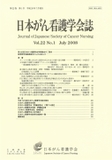Japanese
English
- 販売していません
- Abstract 文献概要
- 参考文献 Reference
要旨
本研究の目的は,脳機能障害をもつ原発性悪性脳腫瘍患者が体験する苦悩を明らかにし,苦悩を緩和するための看護援助を検討することである.脳機能障害をもつ原発性悪性脳腫瘍患者6名を対象に,半構成的面接調査法と参加観察法によりデータ収集し,質的帰納的分析を行った.その結果,脳機能障害をもつ原発性悪性脳腫瘍患者の苦悩は,最終的に,【A.悪性脳腫瘍罹病の脅威】【B.死との対峙】【C.自分らしさの喪失】【D.自己尊厳の低下】【E.生活力の減退】に5分類された.これら5分類の苦悩の性質から導かれる本質的苦悩は,「悪性脳腫瘍がもたらす生命の危機」(A,B),「実存に関わる自己存在の傷つき」(C,D),そして,「生活者としての自立性の低下」(E)であると考えられた.このことから,脳機能障害をもつ原発性悪性脳腫瘍患者が体験する苦悩を緩和するためには,悪性脳腫瘍がもたらす生命の危機に伴う患者の苦しみをありのままに認め患者自身が自分の病状を受容できるように助ける,悪性脳腫瘍患者が残存する脳機能を生かして最大限自立した生活を実現できるよう支援する,悪性脳腫瘍患者が抱く自分らしい存在感を尊重し肯定的価値を支える看護援助が必要であると考える.
Abstract
The purpose of this study was to identify suffering in primary malignant brain tumor patients with neurological dysfunction, and to consider nursing support for such patients to alleviate their suffering. The subjects comprised 6 patients with a primary malignant brain tumor. Data was collected through semi.structured interview and participant observation, and subjected to qualitative inductive analysis. Five main categories were identified: A)the threat of having malignant brain tumor; B)confrontation with death; C)loss of feelings of self; D)loss of dignity; and E)decline in activities of daily living. These findings suggested the following types of essential suffering: a life crisis caused by the malignant brain tumor(A, B); wounded self.existence (C, D); and a decline in self.reliance(E). Nursing support to alleviate the suffering of patients would thus involve the following: accurate recognition of the suffering of patients with a life crisis caused by a malignant brain tumor, and helping patients accept their own condition; support of patients in making their everyday life as independent as possible using their remaining neurological function; and respect for feelings of self in each patient, and sustaining their sense of self.worth.
Copyright © 2008, Japanese Society of Cancer Nursing All rights reserved.


